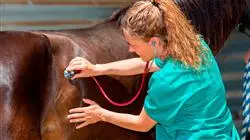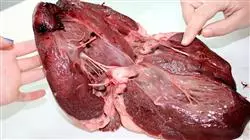University certificate
The world's largest faculty of veterinary medicine”
Introduction to the Program
This program is the best option you can find to specialize in Veterinary Cardiology and make more accurate diagnoses”

Cardiovascular disorders in animals are highly significant because they can affect their quality of life and life expectancy. Advanced knowledge of cardiology is indispensable for large animal veterinarians: ruminants (cattle, sheep, goats), camelids (alpacas, camels and llamas), swine (pigs, wild boars) and equidae (donkeys and mules).
Cardiology in ruminants and swine has been limited for a long time due to the limited literature and diagnostic limitations, especially in advanced therapeutic procedures.
Regarding Equidae, a high number of horses are used for sporting purposes and cardiac pathologies limit their capacity and even force the animal to withdraw from competition. This is more evident the more demanding the equine is in terms of sport and cardiovascular effort. The management of food species differs, but it also affects their production capacity.
In recent years, there has been a boom in the development of novel diagnostic and therapeutic techniques, such as intracardiac electrocardiograms, electrophysiological mapping in arrhythmias, pacemaker implantation and other intracardiac devices that can be implemented in larger species. These advances, which are necessary for an adequate clinical approach, are not available in books.
Therefore, this Postgraduate Certificate offers a comprehensive and well-developed syllabus that addresses advanced cardiology topics, providing detailed descriptions of the different procedures performed depending on the species, as well as a guide for clinical decision-making and patient selection.
This program covers the basics of Cardiology and delves into the most up-to-date and advanced techniques currently available, offering extensive and in-depth content.
The Postgraduate Certificate in Cardiovascular Physiology in Large Animals brings together all the detailed information in the different areas of Cardiology at a high and advanced level of specialization and is taught by renowned professors in the field of internal medicine, cardiology and minimally invasive surgery in veterinary medicine.
Don't miss the opportunity to study this Postgraduate certificate with us. It's the perfect opportunity to advance your career and stand out in an industry with high demand for professionals”
This Postgraduate certificate in Cardiovascular Physiology in Large Animals contains the most complete and up-to-date educational program on the market. The most important features of the program include:
- Development of practical cases presented by experts in Cardiovascular Physiology in Large Animals
- The graphic, schematic, and practical contents with which they are created, provide scientific and practical information on the disciplines that are essential for professional practice
- The latest developments in Cardiovascular Physiology in Large Animals
- Practical exercises where self-assessment can be used to improve learning
- Special emphasis on innovative methodologies in Cardiovascular Physiology in Large Animals
- Theoretical lessons, questions to the expert, debate forums on controversial topics, and individual reflection assignments
- Content that is accessible from any fixed or portable device with an Internet connection
This Postgraduate certificate is the best investment you can make in the selection of a refresher program to update your knowledge in Cardiovascular Physiology in Large Animals"
The multimedia content, developed with the latest educational technology, will provide the professional with situated and contextual learning, i.e., a simulated environment that will provide immersive training programmed to train in real situations.
This program is designed around Problem Based Learning, whereby the specialist must try to solve the different professional practice situations that arise during the academic year. For this purpose, the professional will be assisted by an innovative interactive video system created by renowned and experienced experts in Cardiovascular Physiology in Large Animals.
This training comes with the best didactic material, providing you with a contextual approach that will facilitate your learning"

This 100% online Postgraduate Certificate will allow you to combine your studies with your professional work while increasing your knowledge in this field"
Why study at TECH?
TECH is the world’s largest online university. With an impressive catalog of more than 14,000 university programs available in 11 languages, it is positioned as a leader in employability, with a 99% job placement rate. In addition, it relies on an enormous faculty of more than 6,000 professors of the highest international renown.

Study at the world's largest online university and guarantee your professional success. The future starts at TECH”
The world’s best online university according to FORBES
The prestigious Forbes magazine, specialized in business and finance, has highlighted TECH as “the world's best online university” This is what they have recently stated in an article in their digital edition in which they echo the success story of this institution, “thanks to the academic offer it provides, the selection of its teaching staff, and an innovative learning method aimed at educating the professionals of the future”
A revolutionary study method, a cutting-edge faculty and a practical focus: the key to TECH's success.
The most complete study plans on the university scene
TECH offers the most complete study plans on the university scene, with syllabuses that cover fundamental concepts and, at the same time, the main scientific advances in their specific scientific areas. In addition, these programs are continuously being updated to guarantee students the academic vanguard and the most in-demand professional skills. In this way, the university's qualifications provide its graduates with a significant advantage to propel their careers to success.
TECH offers the most comprehensive and intensive study plans on the current university scene.
A world-class teaching staff
TECH's teaching staff is made up of more than 6,000 professors with the highest international recognition. Professors, researchers and top executives of multinational companies, including Isaiah Covington, performance coach of the Boston Celtics; Magda Romanska, principal investigator at Harvard MetaLAB; Ignacio Wistumba, chairman of the department of translational molecular pathology at MD Anderson Cancer Center; and D.W. Pine, creative director of TIME magazine, among others.
Internationally renowned experts, specialized in different branches of Health, Technology, Communication and Business, form part of the TECH faculty.
A unique learning method
TECH is the first university to use Relearning in all its programs. It is the best online learning methodology, accredited with international teaching quality certifications, provided by prestigious educational agencies. In addition, this disruptive educational model is complemented with the “Case Method”, thereby setting up a unique online teaching strategy. Innovative teaching resources are also implemented, including detailed videos, infographics and interactive summaries.
TECH combines Relearning and the Case Method in all its university programs to guarantee excellent theoretical and practical learning, studying whenever and wherever you want.
The world's largest online university
TECH is the world’s largest online university. We are the largest educational institution, with the best and widest online educational catalog, one hundred percent online and covering the vast majority of areas of knowledge. We offer a large selection of our own degrees and accredited online undergraduate and postgraduate degrees. In total, more than 14,000 university degrees, in eleven different languages, make us the largest educational largest in the world.
TECH has the world's most extensive catalog of academic and official programs, available in more than 11 languages.
Google Premier Partner
The American technology giant has awarded TECH the Google Google Premier Partner badge. This award, which is only available to 3% of the world's companies, highlights the efficient, flexible and tailored experience that this university provides to students. The recognition as a Google Premier Partner not only accredits the maximum rigor, performance and investment in TECH's digital infrastructures, but also places this university as one of the world's leading technology companies.
Google has positioned TECH in the top 3% of the world's most important technology companies by awarding it its Google Premier Partner badge.
The official online university of the NBA
TECH is the official online university of the NBA. Thanks to our agreement with the biggest league in basketball, we offer our students exclusive university programs, as well as a wide variety of educational resources focused on the business of the league and other areas of the sports industry. Each program is made up of a uniquely designed syllabus and features exceptional guest hosts: professionals with a distinguished sports background who will offer their expertise on the most relevant topics.
TECH has been selected by the NBA, the world's top basketball league, as its official online university.
The top-rated university by its students
Students have positioned TECH as the world's top-rated university on the main review websites, with a highest rating of 4.9 out of 5, obtained from more than 1,000 reviews. These results consolidate TECH as the benchmark university institution at an international level, reflecting the excellence and positive impact of its educational model.” reflecting the excellence and positive impact of its educational model.”
TECH is the world’s top-rated university by its students.
Leaders in employability
TECH has managed to become the leading university in employability. 99% of its students obtain jobs in the academic field they have studied, within one year of completing any of the university's programs. A similar number achieve immediate career enhancement. All this thanks to a study methodology that bases its effectiveness on the acquisition of practical skills, which are absolutely necessary for professional development.
99% of TECH graduates find a job within a year of completing their studies.
Postgraduate Certificate in Cardiovascular Physiology in Large Animals
Did you know that with TECH Global University you can explore the complexity of the cardiovascular system and its relevance to the health of large animals? Cardiovascular physiology is a fascinating field that studies the functioning of the circulatory system in the body. When it comes to larger species, such as horses, cows or pigs, understanding cardiovascular physiology is critical to their health and well-being. If you are interested in acquiring specialized knowledge in this area, the Postgraduate Certificate in Cardiovascular Physiology in Large Animals is an excellent choice for you, it will provide you with an in-depth understanding of the anatomy and physiology of the cardiovascular system in large animals. You will learn about the structure and function of the heart, blood vessels and other components of the circulatory system, as well as the mechanisms that regulate blood pressure, blood flow and other cardiovascular parameters.
Understand challenges of cardiovascular physiology in larger species.
One of the advantages of this Postgraduate Certificate is that it will train you to address specific challenges related to cardiovascular physiology in older species. You will explore the physiological differences between animals of different sizes and how these differences can influence their cardiovascular health. In addition, you will gain knowledge of the most common cardiovascular diseases in larger species and how to present and treat these conditions. During the Postgraduate Certificate, you will have the opportunity to participate in internships and case studies that will allow you to apply your theoretical knowledge in real-life situations. You will work closely with veterinary professionals and other experts in cardiovascular physiology. Upon completion of the Postgraduate Certificate in Cardiovascular Physiology in Large Animals, you will be prepared to work in veterinary clinics, research centers or animal health related institutions, where you will be able to apply your skills and contribute to the cardiovascular well-being of large animals. If you are passionate about cardiovascular physiology and want to focus on larger species, don't miss the opportunity to enroll in this top-level Postgraduate Certificate - discover the complexity and relevance of the cardiovascular system in large animals and contribute to their health care!







